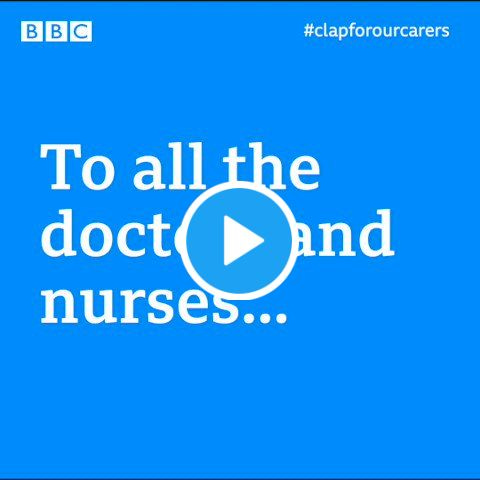Thighsolation
This week: habit reformation, tree climbing, The Perils of Perception, loneliness, applause, and an awful lot of Foiled...
Happy Friday!
And welcome. A particularly warm (yet socially distanced) welcome to all of you friendly folk who signed up off the back of Documentally’s last excellent newsletter. Thanks for joining us — I hope you find something encouraging here.
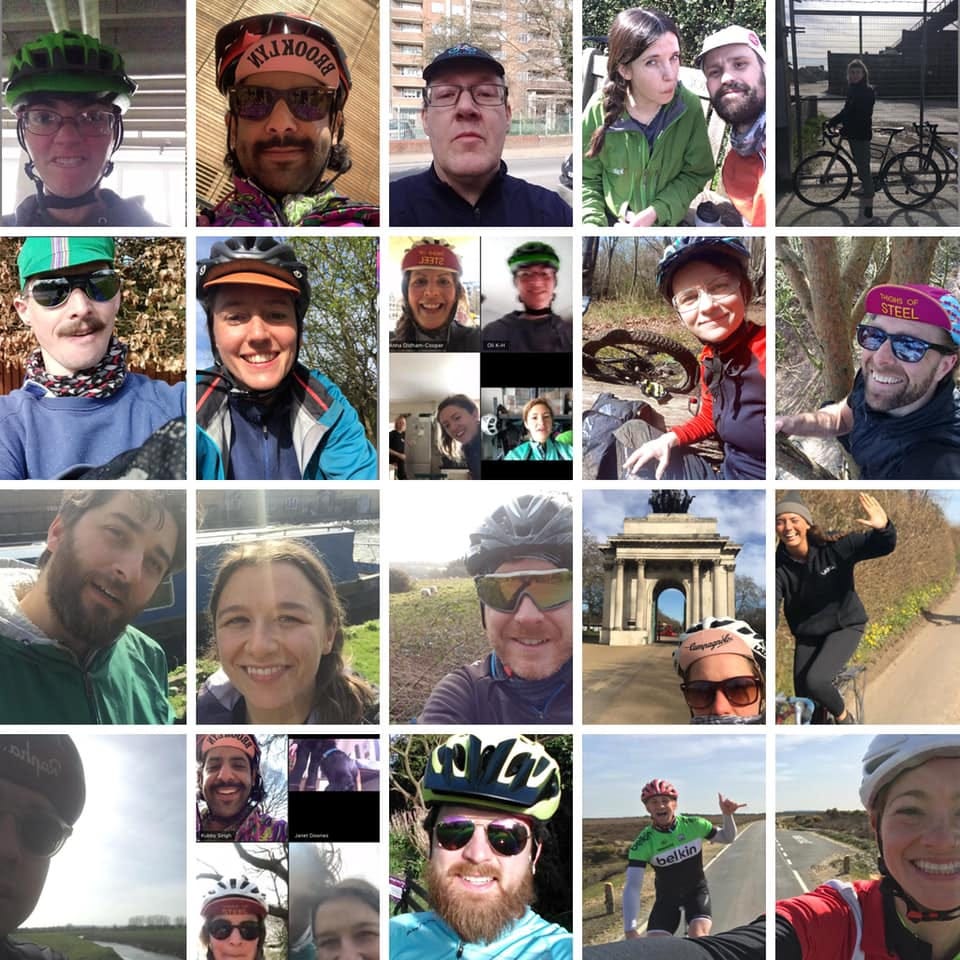
Habit (re)formation in a time of crisis
These moments are rare.
An opportunity to change ourselves forever.
You know why big retailers have loyalty cards, don’t you? Yep — so they can build a picture of your shopping habits and the shopping habits of three generations of humankind and use all this data to sell you more stuff. Cool.
The data these cards collect is a significant revenue stream for supermarkets.
Did you know, for example, that Tesco has its own international data analysis company, Dunhumby? They're actually a pretty big deal, employing over three thousand people in more than thirty countries worldwide, analysing the habits of over 1.3 billion shoppers.
And their analysis can result in some terrifyingly precise marketing campaigns that exploit ‘downstream-plus-context-change’ interventions.
Your supermarket loyalty card scheme will know when you fall pregnant — sometimes before you’ve told anyone else — and will start bombarding you with advertising in an attempt to change your habits so that you’re more profitable for them.
Companies like Dunhumby know that if they can get you now, when your context is changing, when your life is in turmoil, then they stand a good chance of keeping you after the baby arrives and your shopping habits ossify once again. Cool, huh?
This is what we’re interested in.
There’s nothing sinister about downstream-plus-context-change interventions as such: they’re a powerful tool for breaking and reforming robust habits when changing your intention is no longer enough.
‘Downstream’ simply means that you’re in control of the intervention directly (rather than, say, obeying government policy imposed on you ‘upstream’) and ‘context-change’ represents those times in life when big stuff is happening: when you take a new job, move to a new city, start a family — or freak out during a global pandemic.
These are moments when you are vulnerable to substantial and enduring habit change. An opportunity to change ourselves forever. These moments are rare.
Side story: the same mechanism might be on offer during psychedelic trips. The snow globe of your mind is turned upside down and almost everything is up for grabs.
I’ll mention one hopeful grocery-based example here. Yesterday I ran out of fruit and vegetables, so I cycled along to the greengrocer. On my way there, I passed two-metre-spaced queues snaking out of a customer-restricted Tesco Express (housed, shudderingly, inside a deconsecrated church).
When I got to the greengrocer, the shelves were almost audibly complaining about the weight of colourful stacks of seasonal vegetables. Huge sacks of potatoes and other hearty roots were piled up on the cramped shop floor, as if in mocking defiance of the empty supermarket chains.
After filing up my panniers, I asked the woman at the till whether she was busier than normal. ‘A lot busier,’ she said. ‘Hopefully, after this is all over, they’ll keep coming back.’
Thanks to this context-change intervention of Covid-19, I think there’s a good chance this shopkeeper will be quietly pleased come Autumn.
Switching lanes: what other habits could we loop-the-loop with?
I’m a freelance writer, so — as I mentioned last week — my worklife hasn’t actually changed much. I still don’t go to the office, I still don’t chat to colleagues over a brew, I still don’t meet face-to-face with customers or clients.
I work mostly alone, in isolation, as normal.
What has changed, however, is my social connection. And not for the worse.
Over the past week, I have had twenty-six conversations with friends on the phone. As well as these conversations, I’ve also taken part in a virtual pub quiz with rooms full of friends, played online Codenames and Pictionary, had several massive Zoom video meetups — and, of course, cycled off on a remote Thighsolation group ride with a whole peloton of pals from around the world.
Because I need professional help, I have kept a spreadsheet of every single phone call or face-to-face meeting I’ve had with friends over the past three years. Happily, that means we can compare data.
Corona Isolation: 26 conversations
20-26 February 2020: 8 conversations
20-26 January 2020: 18 conversations
20-26 March 2019: 18 conversations
20-26 March 2018: 8 conversations
Three observations:
Weird palindromic pattern in the non-corona numbers.
Ordinarily, I’m pretty isolated, averaging less than two conversations with friends or family per day.
This past week, in contrast, I have had more than three and a half conversations with friends every day.
Obviously, for most people who aren’t freelance WFH writers, this social trend will have been sharply negative. My point isn’t to brag, but to show that change is possible.
If you’re feeling disconnected, then let’s set up a fifteen minute call. What’s to lose? On Tuesday, I had a really nice connection with a friend who got in touch after seeing my Calendly message in last week’s email. Simply book a time slot any day between 6 and 9pm GMT and let’s chat.
There has never been a better time to get into better habits.
We all secretly know this, by the way. It makes me happy to look out of my window and see so many people jogging, cycling and walking past in the sunshine, all discovering what Søren Kierkegaard observed:
Every day I walk myself into a state of well-being and walk away from every illness. I have walked myself into my best thoughts, and I know of no thought so burdensome that one cannot walk away from it.
One of the corona-habits I’m pleased to have slammed back into my routine is cold showers. I would write something inspirational about the experience, but James Parker at The Atlantic has done the work for me:
The water hits, and biology asserts itself. You are not a tired balloon of cerebral activity; you are a body, and you are being challenged. You gulp air; your pulse thumps. Your brain, meanwhile, your lovely, furry old brain, goes glacier-blue with shock. Thought is abolished. Personality is abolished. You’re a nameless mammal under a ravening jet of cold water.
How else I would like to change in the crisis?
I’d like to smile at strangers more (not in a creepy way). I noticed last week that I was avoiding eye contact, as if eyesight was corona laser beams. It takes some courage to look someone in the eye and smile, but it’s always worthwhile, especially if you’re otherwise avoiding one another, quite literally, like the plague.
I’d like to spend three hours outside every day. As this isn’t really possible anymore, I’d like to make the most of the time I can spend outside: suck up the sunshine, the scents and smells.
Related: I’d like to do more foraging. Nature’s allotment is overflowing with three-cornered leek and wild garlic at the moment, and a friend taught me last week that the beautiful hawthorn flowers are edible, leaving a delightfully peppery, buttery aftertaste.
How are you changing?
Social climbing
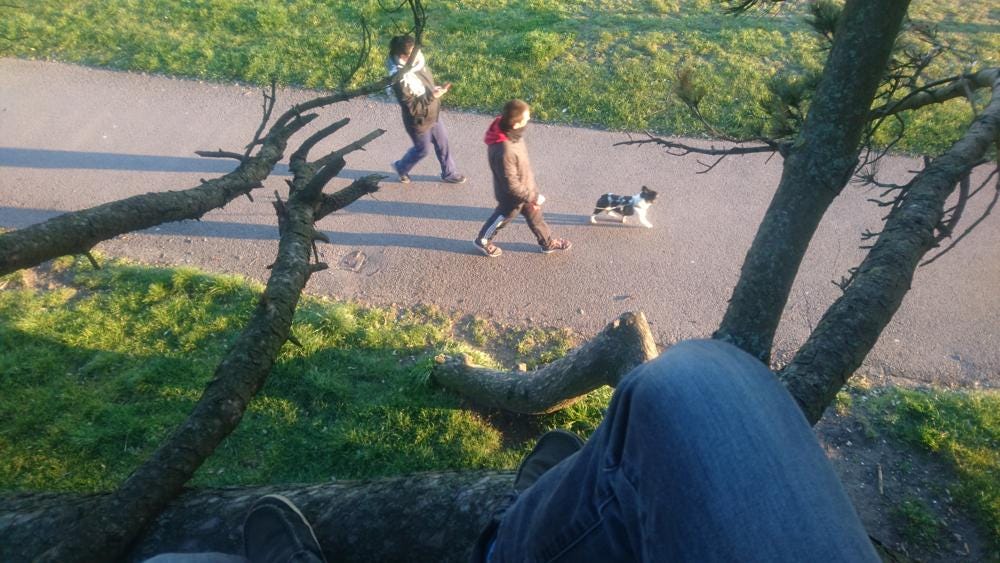
Imagine a world high above the world, a world full of budding life, far from the ills of the world, where even the strayest human passes distantly beneath the world; a world of nooks and canopies giving out onto blue skies and blackbirds, a world we can explore anew, like we did when we were new, when hours would pass before anyone came calling; a world of secret hideaways and free isolation, where perspective comes easy, far over and above schooldays and workdays; a world where we might find refuge, shelter and peace.
This world is here. Up here. In the trees.
Last Saturday was the International Day of Forests and I accidentally observed the moment by climbing no less than six trees.
Crouched in the branches of a pine that grows like a climbing frame over the gate to our garden, watching the toings and froings of pensioners and parents in their two metre bubbles, I am struck by a memory of one of the first short stories I ever wrote.
Perched was written more than ten years ago, during the dying days of my office-based career, written while sitting at the foot of a willow along the banks of the Thames in August, on an evening before and after long days as a stifling data entry clerk.
It wasn’t obvious until a month later, when I walked out of the job without notice, what this story was about. Now, as I perch on this flaking old pine, I’m jolted back to its secret yearnings to escape the day-to-day, up and away, into the canopy.
He was perched high up in the tree with his fingers curled around the branch like a bird. He was frozen still, but his muscles were taut as if he were about to fly away. Which of course he wasn’t, because, aside from being a man in a bowler hat perched in a tree, he looked perfectly normal.
If you’re keen, you can read the rest of the very short story on my website.
Books Make Books: The Perils of Perception by Bobby Duffy
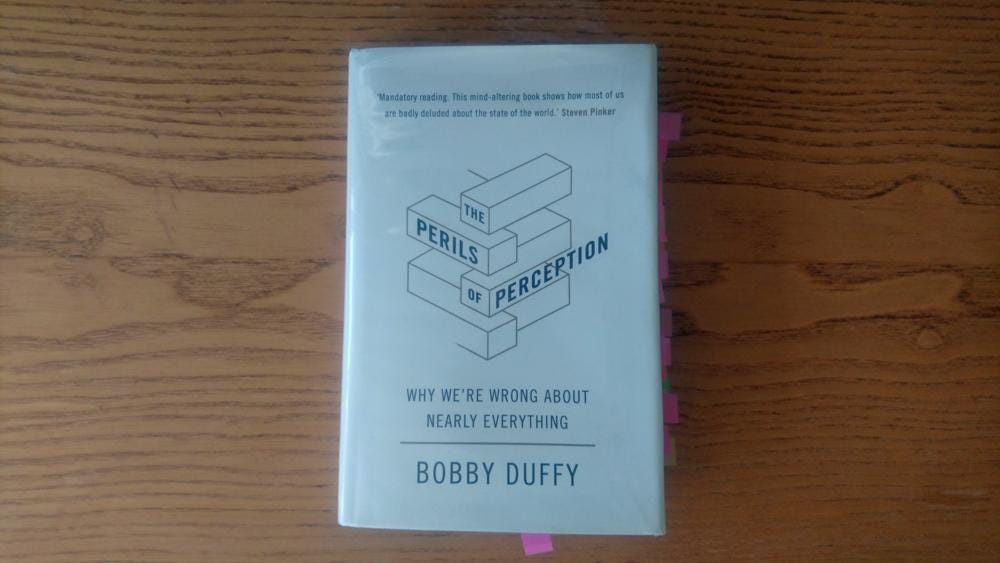
This week I uploaded another Books Make Books summary, this time for the very excellent The Perils of Perception by Bobby Duffy.
There were so many snippets I could have excised from this book about ‘Why we’re wrong about nearly everything’, but I managed to keep it down to five.
Some of the excerpts now look quite chilling in the blue light of the coronavirus (‘The more who die, the less we care’), but here’s a concept, new to me, that’s a little more optimistic:
Pluralistic Ignorance
Social norms can linger long after their sell-by date, partly because we think some beliefs and behaviours are much more common than they really are. We should have more courage in our convictions, and guard against stereotyping our fellow citizens.
Now is the time to speak out and act up!
Side story: I got this book out of the library last month, rushed to copy out all my notes before it ran overdue, and now can’t return it until July. There’s no moral to this side story.
Thanks to M.G. for the recommendation. You can recommend books I should read too.
Can’t even deal?
Here are three things that I’ve found helpful to understanding my psychology while operating under corona conditions this week.
ONE: Kurzgesagt do brilliant short primers on a dazzling array of topics, but this one on loneliness is particularly relevant:
When you’re lonely, your brain is much more receptive and alert to social signals while at the same time it gets worse at interpreting them correctly. You pay more attention to others, but you understand them less.
TWO: Mo Gawdat on the How to Fail podcast. At first I thought: Pah — what can ‘Mr Google’ teach me about dealing with life under lockdown? Then I was all like: ‘Shit, this is profound!’ Thanks to H.S. for sharing this.
THREE: Both Headspace and Calm have released free Covid-19 meditation audio. Personally I prefer the sound of Mo Gawdat’s ‘Listening to Becky’, but we need all the resources we can muster.
Foiled is back — so back!

Huge news: Radio Wales have decided to do their bit to save the world (from boredom) and have released all three serieses of Foiled on BBC Sounds. (Only after making sure that we'd waive our repeat fees, obviously.)
You. Are. Welcome.
Not only that, but Beth and I have been spending some time this week writing what will — with a pinch of luck — become Series 4 of the world’s most successful radio sitcom set in a Welsh hair salon.
Full marks to…
The man in the panic-buying supermarket who, after staring aghast at the empty shelves, turned to the shop assistant and beseeched him: ‘Do you not have any… pistachio oil?’
The refugee in Turkey who emailed my mum, urgently asking whether our family were okay.
The NHS and everyone who took part in the spine-riffling Clap For Carers last night. I really didn’t think Bournemouth would be much into it, but I could hear claps, cheers, whistles and whoops echoing all around town, from pier to pier, from neighbours near and far. Let’s do this every week, shall we?
Your neck of the woods?
I’m very much staying put for the foreseeable future, so there’s not much to report here. All of my social activity has joined my work online.
In a combination of the two, I’m excited about interviewing Merlin Sheldrake about the wonders of fungi. This is the sort of thing he casually tweets:

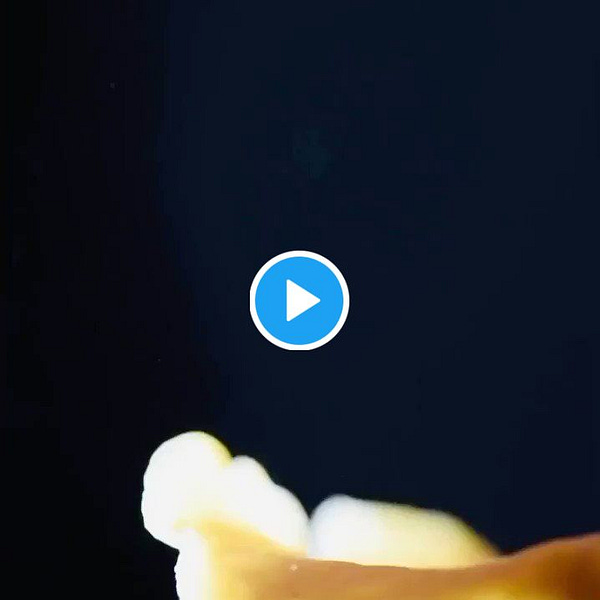
Tonight is the launch of a crowdfunder for Flight Free UK, a campaign that politely suggests we all take a year off air travel. Shouldn’t be too hard with airports closed, flights cancelled and airlines going out of business! Oh, and it’s probably a nice idea for the planet too.
Much love — and remember: ‘all life-forms are processes not things’.
dc:
CREDITS
David Charles wrote this newsletter. He publishes another newsletter about reading called Books Make Books. David is co-writer of BBC Radio Wales sitcom Foiled, and writes for The Bike Project, Forests News, Global Landscape Forum, Elevate and Thighs of Steel. He also edits books about adventure, activism and more. Reply to this email, or delve into the archive on davidcharles.info. Thank you for reading!
Unlock the commons for £30
These free weekly newsletters are currently 0.8 percent funded. You can unlock the commons for everyone by becoming a paying subscriber for £30 a year. Thank you.



